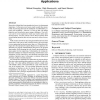84 search results - page 3 / 17 » Zero-Knowledge and Code Obfuscation |
WCRE
2005
IEEE
13 years 10 months ago
2005
IEEE
In recent years, code obfuscation has attracted attention as a low cost approach to improving software security by making it difficult for attackers to understand the inner worki...
DRM
2003
Springer
13 years 10 months ago
2003
Springer
Protection of digital data from unauthorized access is of paramount importance. In the past several years, much research has concentrated on protecting data from the standpoint of...
ACSAC
2008
IEEE
13 years 11 months ago
2008
IEEE
We propose STILL, a generic defense based on Static Taint and InitiaLization anaLyses, to detect exploit code embedded in data streams/requests targeting at various Internet servi...
CCS
2007
ACM
13 years 11 months ago
2007
ACM
Despite the recent advances in the theory underlying obfuscation, there still is a need to evaluate the quality of practical obfuscating transformations more quickly and easily. T...
ESORICS
2011
Springer
12 years 4 months ago
2011
Springer
Abstract. Trigger-based code (malicious in many cases, but not necessarily) only executes when specific inputs are received. Symbolic execution has been one of the most powerful t...

